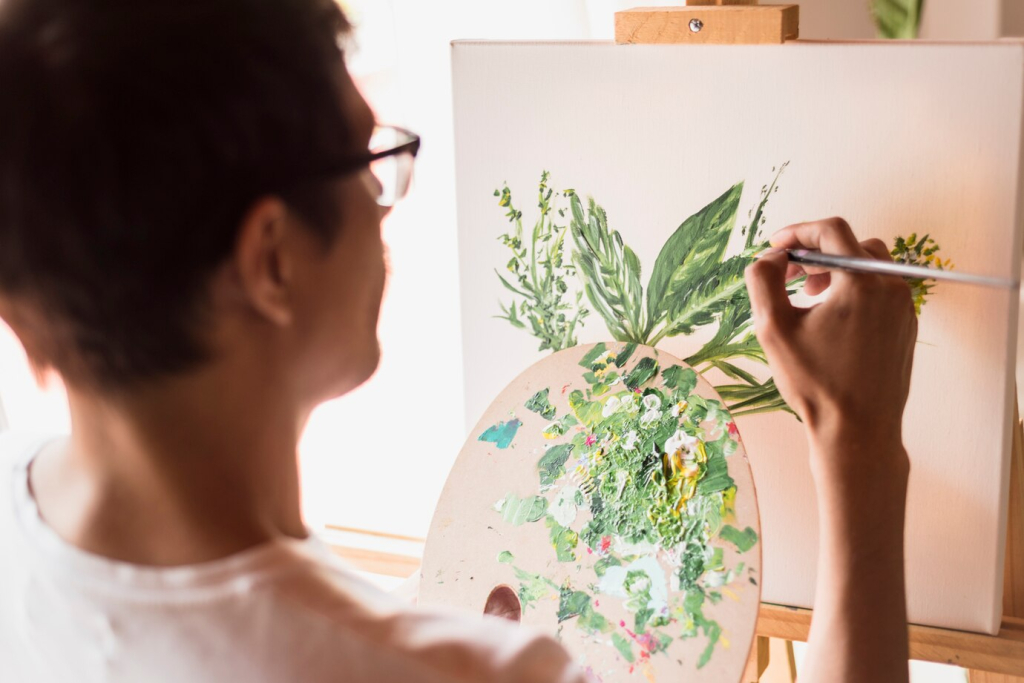The Therapeutic Power of Hobbies for Mental Health

Engaging in hobbies has been recognized as a powerful tool for promoting good mental health and enhancing mental well-being. Individuals facing challenges with poor mental health can find solace and rejuvenation through the pursuit of hobbies.
The best hobbies offer many health benefits by providing an outlet for self-expression, stress relief, and a sense of accomplishment. Activities like painting, gardening, or playing a musical instrument have positively impacted mood and cognitive function.
A lot of research shows that the therapeutic power of hobbies extends beyond mere enjoyment, contributing to the overall balance and resilience of one’s mental health, including improved blood pressure, increased cortisol levels (immune system) and endorphins (feel-good chemicals), heightened neural connections, they reduce stress, and contribute greatly to one’s self-esteem.
In fostering a sense of purpose and joy, pursuing the best hobbies becomes a meaningful and accessible strategy for maintaining and improving mental well-being.
Hobbies that contribute to good mental health

Exploring a new hobby is a gateway to unlocking mental health benefits, as engaging in activities and everyday tasks pique one’s interest that can significantly improve mental well-being.
The act of discovering a new hobby during spare or leisure time can be transformative, offering a positive outlet for self-expression and relaxation. Whether joining a fun dance class, participating in a new team sport, or spending quiet time pursuing a solo interest like visual art or making art, or book club, hobbies contribute to a holistic approach to mental health.
The benefits extend beyond the joy of the activity itself, fostering social connections, reducing stress, and enhancing overall cognitive function. In pursuing hobbies, individuals find meaningful and enjoyable ways to spend their time and cultivate a proactive approach to maintaining and improving their mental health.
Physical health

Physical health is intricately linked to an active lifestyle, and incorporating physical activity into spare time is essential for overall well-being. You may enjoy outdoor exercise, outdoor hobbies, and other fun activities or participate in team sports that benefit your physical health and are a robust strategy to improve your mental health.
Engaging in cardio exercises, be it through running, cycling, or playing sports, stimulates the release of endorphins, promotes a positive mood, keeps you away from negative thoughts, and reduces stress.
Whether you choose a hobby like working out at a local gym, engaging in outdoor activities, or embracing the camaraderie of team sports, prioritizing physical activity contributes to maintaining a healthy body and mind.
The synergy between outdoor exercise, team sports, and mental health underscores the holistic nature of a balanced and active lifestyle, emphasizing the importance of regular physical activity for overall wellness.
Mental health benefits

Spending time engaging in various activities not only creates happy memories but also brings forth an array of mental health benefits, like being able to manage symptoms for high stress levels, keeping one emotionally balanced and highly functional. The positive impact on mental health is undeniable, as individuals find solace and improve mental well-being through meaningful experiences.
From important opportunities in fostering social connections to cultivating a sense of purpose, the mental health benefits of spending time on enjoyable pursuits extend beyond the immediate moment.
Whether pursuing hobbies, spending quality time with loved ones, or creating happy memories through adventures, these activities contribute significantly to an improved mental health landscape.
Recognizing the intrinsic link between positive experiences and mental well-being underscores the importance of deliberately incorporating joyous moments into our lives for long-lasting mental health benefits.
Reduce stress

In the realm of mental health, managing stress levels is paramount, particularly when confronted with life-changing events. The toll of stress on mental health can contribute to the onset of mental illness and heightened anxiety.
Amidst these challenges, incorporating the practice of journaling helps as part of your daily routine. It alleviate stress by providing an outlet for expressing emotions and processing thoughts. By jotting down one’s experiences and emotions, individuals can gain clarity, increase attention span, identify stress triggers, and cultivate positive thoughts.
This intentional act of reflection can be a transformative tool in mitigating the impact of stress on mental health, fostering resilience, and paving the way for a more balanced and composed approach to life’s inevitable ups and downs.
Coping mechanisms for mental health
Having a “Me Time”
When you dedicate time for yourself, it can be a powerful practice that cultivates mental peace. Embracing solitude, whether by exploring a new place or enjoying a meal alone, is a valuable way to recharge and foster inner tranquility. It’s not merely about being alone; it’s about relishing your own company without feeling lonely.
Travel alone
Embarking on a journey to a destination you’ve long desired to visit and exploring unfamiliar places can be a transformative experience with profound benefits for your mental health.
The anticipation and fulfillment of seeing a dream destination evoke a sense of joy and accomplishment, contributing positively to your overall well-being. Venturing into new and uncharted territories stimulates a sense of adventure and encourages personal growth and resilience.
Shopping
Investing in yourself is a meaningful use of your hard-earned money and one of the pleasurable activities. It is a form of self-care that extends beyond material possessions. Consider it a process of nurturing your inner child by indulging in things that were once out of reach but are now within your means.
Watch your favorite movie
Rewatching your favorite movie or series can serve as an effective method for keeping you off low mood. Returning to a beloved narrative provides a comforting familiarity that transcends mere entertainment, offering a sense of nostalgia and joy. Movie date nights can even be a great hobby and part of your group activities.
Listen to music
Music’s profound impact on the mind is evident in its ability to soothe and evoke emotions that can transform one’s mood. Music acts as a therapeutic medium, calming the mind and facilitating an emotional journey. Appreciating music from different genres can be part of your new hobbies.
Talk to a friend
Opening up and sharing with your most trusted friend, especially when you experience stress, is akin to unburdening your heart in a sanctuary of trust and understanding. Entrusting someone with your thoughts and feelings, especially a confidant with a special place in your life, creates a profound connection.
Sharing your experiences, challenges, and triumphs with a trusted friend provides a valuable outlet for self-expression and strengthens the bond of friendship. You can turn this courageous act into a hobby that you and your friends can genuinely enjoy.
Yoga
Going for improved mood? Meditation may be one of the slowest paced hobbies, yet a powerful tool for coping with life’s challenges, offering a sanctuary for the mind to find calm amidst the chaos. Through mindfulness and intentional breathing, meditation provides a structured and serene space for self-reflection and mental rejuvenation.
Art
Engaging in creative activities is a new skill and one of the great hobbies for mental health. Start by identifying your special spot, grab a few paintbrushes and other art materials and paint all your stress and anxiety away.
Key Takeaways
Hobbies have therapeutic value beyond simply enjoyment, adding to one’s mental balance and resilience. Pursuing the finest hobbies creates a feeling of purpose and delight, making it a meaningful and accessible method for keeping off poor mental health and anxiety.
The benefits go beyond the enjoyment of the exercise itself, promoting social ties, lowering stress, keeping mental illness at bay, and improving general cognitive performance. Individuals who pursue hobbies have fun and develop a proactive attitude to preserving and growing their mental health.
Physical health as a hobby is inextricably tied to an active lifestyle, and adding physical activity into your free time is critical for general well-being. You may like outdoor exercise or team sports, which boost your physical health and serve as an effective technique for improving poor mental health.
Cardio workouts, such as jogging, cycling, or playing sports, boost the production of endorphins, which promotes a pleasant mood and reduces stress. Participating in numerous activities not only produces joyful memories but also provides a variety of mental health advantages.
The beneficial influence on mental health is evident as individuals find peace and improve their mental well-being via meaningful activities. Spending time on pleasant pastimes has long-term mental health advantages, from developing social relationships to cultivating a sense of purpose.

Celebrate Life’s Milestones in Camella!
Make unforgettable memories in a Camella home.
Our communities are designed to elevate your living experience.


